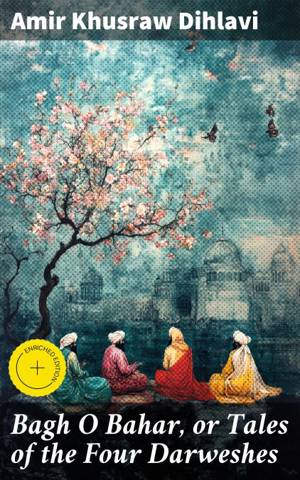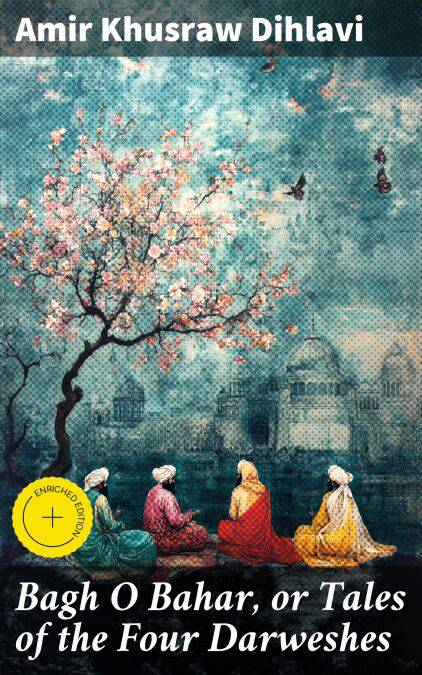
- Afhalen na 1 uur in een winkel met voorraad
- Gratis thuislevering in België vanaf € 30
- Ruim aanbod met 7 miljoen producten
- Afhalen na 1 uur in een winkel met voorraad
- Gratis thuislevering in België vanaf € 30
- Ruim aanbod met 7 miljoen producten
Zoeken
Bagh O Bahar, or Tales of the Four Darweshes E-BOOK
Enriched edition. A Timeless Tapestry of Fate and Love in Medieval Persia
Amir Khusraw Dihlavi
E-book | Engels
€ 1,99
+ 1 punten
Uitvoering
Omschrijving
In "Bagh O Bahar, or Tales of the Four Darweshes," Amir Khusraw Dihlavi draws on a rich tapestry of Sufi philosophy, folklore, and narrative artistry to weave a series of enchanting tales. The text is structured around the adventures of four wandering dervishes, each embodying a unique life lesson that resonates with the spiritual and moral ethos of 13th-century India. Khusraw's exquisite prose, characterized by eloquent imagery and intricate dialogue, invites readers into a world where humor and wisdom coexist, reflecting the syncretic cultural landscape of his time, which fuses Persian, Indian, and Islamic literary traditions. Amir Khusraw Dihlavi, often hailed as the "Father of Urdu Literature," was a polymath whose life spanned a period rich in cultural exchange and spiritual inquiry. Educated at the court of Alauddin Khilji, Khusraw's engagement with diverse languages and philosophies likely influenced his creation of this work, which seeks to bridge social divides and elevate the moral consciousness of its audience, celebrating the human experience through parables and wit. His intimate knowledge of mysticism and courtly life provides depth to the narrative, offering insight into the complexities of his era. "Bagh O Bahar" is a recommended read for anyone interested in the transformative power of storytelling and the enduring legacy of Sufi literature. Khusraw's tales not only entertain but prompt profound reflections on the nature of existence, virtue, and the paths we choose. Readers will find themselves captivated by the delicate balance of humor and wisdom, making this work a timeless addition to the canon of world literature.
In this enriched edition, we have carefully created added value for your reading experience:
- A succinct Introduction situates the work's timeless appeal and themes.
- The Synopsis outlines the central plot, highlighting key developments without spoiling critical twists.
- A detailed Historical Context immerses you in the era's events and influences that shaped the writing.
- An Author Biography reveals milestones in the author's life, illuminating the personal insights behind the text.
- A thorough Analysis dissects symbols, motifs, and character arcs to unearth underlying meanings.
- Reflection questions prompt you to engage personally with the work's messages, connecting them to modern life.
- Hand‐picked Memorable Quotes shine a spotlight on moments of literary brilliance.
- Interactive footnotes clarify unusual references, historical allusions, and archaic phrases for an effortless, more informed read.
In this enriched edition, we have carefully created added value for your reading experience:
- A succinct Introduction situates the work's timeless appeal and themes.
- The Synopsis outlines the central plot, highlighting key developments without spoiling critical twists.
- A detailed Historical Context immerses you in the era's events and influences that shaped the writing.
- An Author Biography reveals milestones in the author's life, illuminating the personal insights behind the text.
- A thorough Analysis dissects symbols, motifs, and character arcs to unearth underlying meanings.
- Reflection questions prompt you to engage personally with the work's messages, connecting them to modern life.
- Hand‐picked Memorable Quotes shine a spotlight on moments of literary brilliance.
- Interactive footnotes clarify unusual references, historical allusions, and archaic phrases for an effortless, more informed read.
Specificaties
Betrokkenen
- Auteur(s):
- Vertaler(s):
- Uitgeverij:
Inhoud
- Aantal bladzijden:
- 294
- Taal:
- Engels
Eigenschappen
- Productcode (EAN):
- 4057664644701
- Verschijningsdatum:
- 24/11/2019
- Uitvoering:
- E-book
- Beveiligd met:
- Digital watermarking
- Formaat:
- ePub

Alleen bij Standaard Boekhandel
+ 1 punten op je klantenkaart van Standaard Boekhandel
Beoordelingen
We publiceren alleen reviews die voldoen aan de voorwaarden voor reviews. Bekijk onze voorwaarden voor reviews.








